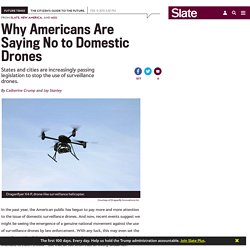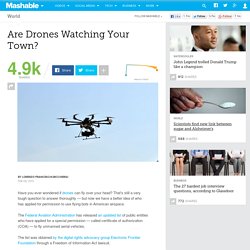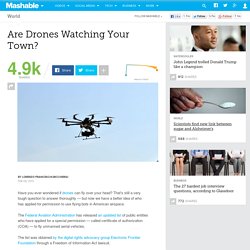

Domestic surveillance drone bans are sweeping the nation. Courtesy of Draganfly Innovations Inc In the past year, the American public has begun to pay more and more attention to the issue of domestic surveillance drones.

And now, recent events suggest we might be seeing the emergence of a genuine national movement against the use of surveillance drones by law enforcement. With any luck, this may even set the stage for a wider dialogue about the increasingly intrusive technologies that are intended to catch crooks—but that all too often cast an overly broad net. Last week, after an especially raucous city council hearing, the Seattle police department terminated its drones program and agreed to return the purchased equipment to the manufacturer. This came just days after both houses of the Virginia state legislature passed historic bills imposing a two-year moratorium on the use of drones by law enforcement and regulatory agencies in the state.
One possibility is that there’s something uniquely ominous about a robotic “eye in the sky.”
Drone delivery. Are Drones Watching Your Town? Have you ever wondered if drones can fly over your head?

That's still a very tough question to answer thoroughly — but now we have a better idea of who has applied for permission to use flying bots in American airspace. The Federal Aviation Administration has released an updated list of public entities who have applied for a special permission — called certificate of authorization (COA) — to fly unmanned aerial vehicles. The list was obtained by the digital rights advocacy group Electronic Frontier Foundation through a Freedom of Information Act lawsuit. The EFF had already released in April a partial list of 61 entities that had applied for drone permits. With the new additions, the total goes up to 81. The previous list specified which applications were active (thus approved), which ones expired and which ones were disapproved (including one from the Georgia Tech Police Department, which wanted to fly drones at football games.)
A number of legislators have raised the same questions.
Mashable. Have you ever wondered if drones can fly over your head?

That's still a very tough question to answer thoroughly — but now we have a better idea of who has applied for permission to use flying bots in American airspace. The Federal Aviation Administration has released an updated list of public entities who have applied for a special permission — called certificate of authorization (COA) — to fly unmanned aerial vehicles. The list was obtained by the digital rights advocacy group Electronic Frontier Foundation through a Freedom of Information Act lawsuit. The EFF had already released in April a partial list of 61 entities that had applied for drone permits.
With the new additions, the total goes up to 81. The previous list specified which applications were active (thus approved), which ones expired and which ones were disapproved (including one from the Georgia Tech Police Department, which wanted to fly drones at football games.) Drone / privacy. DRONE. China’s robot revolution. The Ying Ao sink foundry in southern China’s Guangdong province does not look like a factory of the future.

The sign over the entrance is faded; inside, the floor is greasy with patches of mud, and a thick metal dust — the by-product of the stainless-steel polishing process — clogs the air. As workers haul trolleys across the factory floor, the cavernous, shed-like building reverberates with a loud clanging. Guangdong is the growth engine of China’s manufacturing industry, generating $615bn in exports last year — more than a quarter of the country’s total. In this part of the province, the standard wage for workers is about Rmb4,000 ($600) per month. Ying Ao, which manufactures sinks destined for the kitchens of Europe and the US, has to pay double that, according to deputy manager Chen Conghan, because conditions in the factory are so unpleasant.
Nine robots now do the job of 140 full-time workers. The company, which exports 1,500 sinks a day, spent more than $3m on the robots. Drones.